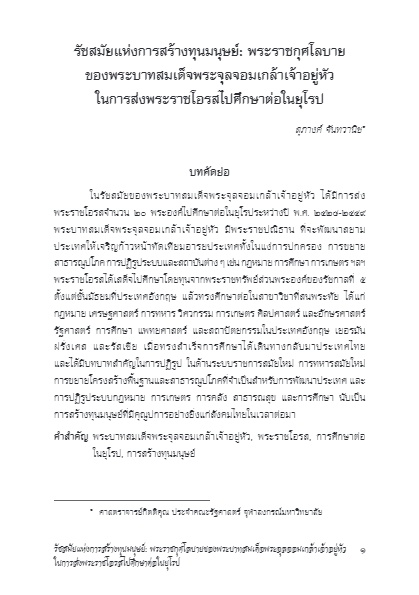สุภางค์ จันทวานิช
บทคัดย่อ
ในรัชสมัยของพระบาทสมเด็จพระจุลจอมเกล้าเจ้าอยู่หัว ได้มีการส่งพระราชโอรสจำนวน 20 พระองค์ไปศึกษาต่อในยุโรประหว่างปี พ.ศ. 2428-2449 พระบาทสมเด็จพระจุลจอมเกล้าเจ้าอยู่หัว มีพระราชปณิธาน ที่จะพัฒนาสยามประเทศให้เจริญก้าวหน้าทัดเทียมอารยประเทศทั้งในแง่การปกครอง การขยายสาธารณูปโภค การปฏิรูประบบและสถาบันต่าง ๆ เช่น กฎหมาย การศึกษา การเกษตร ฯลฯ พระราชโอรสได้เสด็จไปศึกษาโดยทุนจากพระราชทรัพย์ส่วนพระองค์ของรัชกาลที่ 5 ตั้งแต่ชั้นมัธยมที่ประเทศอังกฤษ แล้วทรงศึกษาต่อในสาขาวิชาที่สนพระทัย ได้แก่ กฎหมาย เศรษฐศาสตร์ การทหาร วิศวกรรม การเกษตร ศิลปศาสตร์ และอักษรศาสตร์ รัฐศาสตร์ การศึกษา แพทยศาสตร์ และสถาปัตยกรรมในประเทศอังกฤษ เยอรมัน ฝรั่งเศส และรัสเซีย เมื่อทรงสำเร็จการศึกษาได้เดินทางกลับมาประเทศไทย และได้มีบทบาทสำคัญในการปฏิรูป ในด้านระบบราชการสมัยใหม่ การทหารสมัยใหม่ การขยายโครงสร้างพื้นฐานและสาธารณูปโภคที่จำเป็นสำหรับการพัฒนาประเทศ และการปฏิรูประบบกฎหมาย การเกษตร การคลัง สาธารณสุข และการศึกษา นับเป็นการสร้างทุนมนุษย์ที่มีคุณูปการอย่างยิ่งแก่สังคมไทยในเวลาต่อมา
คำสำคัญ : พระบาทสมเด็จพระจุลจอมเกล้าเจ้าอยู่หัว, พระราชโอรส, การศึกษาต่อในยุโรป, การสร้างทุนมนุษย์
(ตีพิมพ์ใน วารสารไทยศึกษา ปีที่ 14 ฉบับที่ 2 (กรกฎาคม – ธันวาคม 2561) หน้า 1-28)
The Reign of Human Capital Accumulation : King Chulalongkorn’s Policy in Sending His Sons to Study in Europe
Supang Chantavanich
Abstract
During the reign of King Chulalongkorn, twenty of his sons were sent to continue their studies in Europe during 1885-1906. The King had a resolution to modernize Siam in many fields, including administration, infrastructure development, as well as reforms in the judicial, education and agricultural sectors. The Siamese princes were sponsored by King Chulalongkorn’s own funds to study from public school level to university level. The fields of study covered law, economics, military, engineering, agriculture, liberal arts, political science, education, medical science and architecture in England, Germany, France and Russia. After graduation, all the princes returned to Siam and became significant driving forces in the reform of the nation. Modern bureaucracy, Western army, expansion of infrastructure (roads, railways, canals) and public utilities (water) necessary for development, as well as reforms in law, finance, education, public health and agriculture, were put in place. King Chulalongkorn’s investment in human capital accumulation through the international migration of his sons to Europe proved important in modernizing Thailand.
Keywords : King Chulalongkorn, Sons of King Chulalongkorn, International migration in Europe, human capital accumulation
(Published in Journal of Thai Studies Volume 14 Number 2 (July – December 2018) Page 1-28)
บทความ / Full Text : Download
